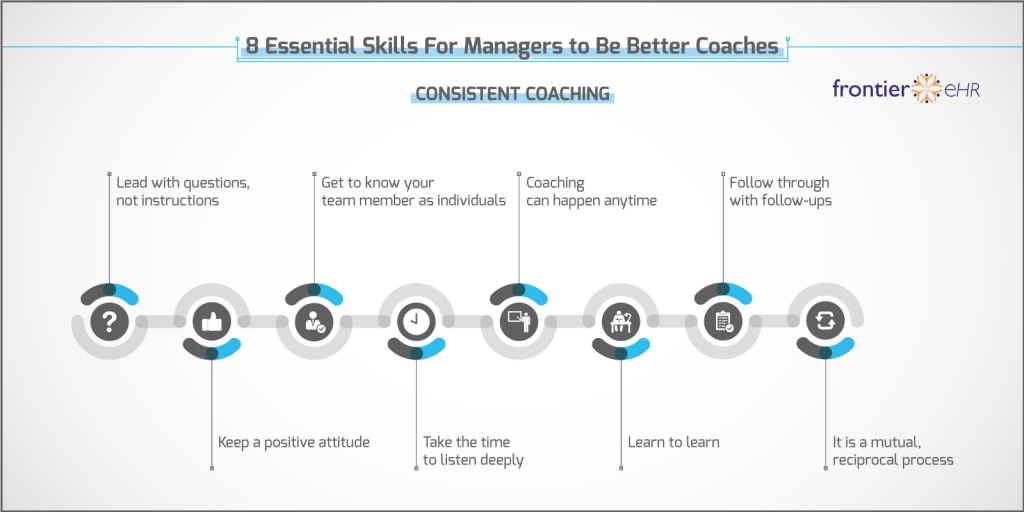8 Essential Skills for Managers to Be Better Coaches
8 Essential Skills for Managers to Be Better Coaches
According to a report by Gallup, only 13% of employees working for an organization worldwide is engaged, meaning they are enthusiastic and committed to their work and workplace. Managers play a pivotal role, directly and indirectly, in influencing employees in their day-to-day work. Given their influence, how can managers help in engaging the workforce?
The answer can be found in consistent coaching.
In the past, command-and-control leaders are driven by the needs of having more information than their subordinates and exercising control in every aspect of the company. Today, this old-school leadership style is gradually yielding its place to a coaching culture; employees are looking for managers who can guide and develop them, encourage actions and hold them accountable to growth. Consistent coaching has been shown to be extremely beneficial for organizations.
Another study conducted by Bersin & Associates found that organizations with senior management leaders, who effectively and frequently coached their employees, improved their business results by 21% as compared to those who did not do so. Consistent coaching is found to be especially effective in staff onboarding and retention, performance and career development, productivity gain and knowledge transfer. However, most managers do not practise coaching because they do not see it as an important part of their role; they sometimes lack the skill or the patience to conduct one-to-one coaching conversations withal. But it does not need to be that hard.
Here are 8 essential skills and competencies for managers who wish to equip themselves in coaching their teams. Each of these skills is designed to spark new insights and perspectives to invigorate the greatness of others around you.
Lead with questions, not instructions
Managers are used to telling their team members what to do. This is often done in a directive manner which is fine if your team members are asking for your opinions. However, if you want to encourage creativity and empowerment in your workplace, it is best to engage your team through open-ended questions. You may ask about where your team members see their careers heading, or should their roles evolve in the company? Such questions prompt them to ponder over their career development within the organization.
You may open a conversation with a coaching question such as “What is the real challenge for you?” or “What areas do you want to strengthen, improve, or develop?” Remember, your goal as a coach is to help your team members find their own answers while solidifying their goals and challenges, and to help them identify what they want to achieve and what they have to do to get there.
Keep a positive attitude
You should always try to maintain a positive outlook on things, even when confronted with difficult situations. Trying to be a good coach while at the same time a critical perfectionist, relentlessly pointing out your team members’ short comings, will erode their confidence and reduce their level of engagement at work. Instead, help them along with kind words and advice, and constructive feedback instead of insults; you are far more likely to receive positive outcomes than hitting your team members with negativity. It is your responsibility as a coach to not only set the pace of the working environment but to also keep tabs on the vibes around the team and keep out as much of the negativity as possible. A positive attitude toward situations will help both you and your team members maintain faith and react in a way that promotes positive change.
Get to know your team member as individuals
Managers these days have to meet the challenges of managing a multi-generational workforce: Baby Boomers (1948-1963), Generation X (1964-1978) and Millennials (1979-1991). In fact, the diversity also covers a spectrum of backgrounds, cultures, and nationalities. A manager should not make assumptions to generalise the needs and expectations of the team members; instead get to know each individual, their ambitions, and expectations towards career progression, skills development and performance management.
Use coaching questions to discover goals and outside interests of your team members; you may be pleasantly surprised to find talents you were not aware existed within your team. Having a good understanding of your team members will help you, as a manager, identify each of their strengths and weaknesses, and thus learn how to better work with them, assign responsibility and specific tasks, and help develop each of them as an individual.
I would encourage an ongoing habit of reviewing each of their performance, opening up a regular communication and meaningful feedback channel, instead of waiting for the year-end review to take place. In fact, implement an appraisal system that is able to accommodate ongoing reviews throughout the year.
Take the time to listen deeply
Have you ever tried to carry a conversation with a person who was distracted? Contrast that with an experience of communicating with someone who offers you his or her complete attention when you are speaking, without interrupting you. Which conversation would you prefer?
Coaching requires you to be encouraging and empowering. You must clear your mind to create room to embrace deep listening so you are fully focused on what others are telling you and what they mean. Such keen listening skills will enable you to ask powerful questions, make intentional responses and encourage your employees to open up and to think out-of-the-box.
Your employees have a lot to contribute, but they cannot do so without having questions and providing feedback. It is important for you to show that you are genuinely interested in their success, listening to what they have to say and encouraging them to share their views. You will reap the benefit when you have successfully built one-on-one relationships with your team members.
Coaching can happen anytime
Keep your door open and make yourself accessible to your team members. Unlike traditional coaching sessions, which often happened after being hit by a particular challenging issue, coaching can happen anytime, anywhere. Effective learning happens on the job when things are happening and you seize the opportunity to create meaningful coaching moments each day in a variety of workplace situations. Learn to develop a keen observation skill, even before a team member approaches you with questions related to work. Always try to coach your team members while things are occurring at work. However, if you are busy when you are being approached, you should schedule a time to meet up later to revisit the topic.
Learn to learn
Commit yourself to lifelong learning; always seek to improve your own knowledge and competencies to better perform your work. If you are not setting a good example, your employees will miss out on the opportunity to emulate a great role model. Lead by example; as the adage goes, “actions speak louder than words”. Furthermore, if you are not intentionally developing yourself, you may not be able to offer valuable insights to your team in a dynamic environment.
Follow through with follow-ups
Coaching is a continual process. In order to build trust with your team, which is vital for effective coaching, you must show that you care enough to follow through in supporting your employees’ development plans. The more your team members trust you, the more productive your coaching sessions become.
Encourage action and create accountability. It is not uncommon for your team members to get caught up in venting their frustrations during a coaching session – “I can’t find time to build a new sales channel,” or “I am always interrupted during my work so I can’t get anything done,” or “No one has done it before so I can’t find anyone to ask.” While it may be acceptable to offer a temporary window for them to let out some pent-up frustrations, it is not constructive for them to dwell on the negative moods.
While acknowledging their challenges, encourage them to take actions and create accountability by asking: what strengths will you draw on to help you? How can you get the resources you need? What do you need to ensure that you move forward? How can I best support you and hold you accountable for the results you want to achieve?
You must show that you are personally interested in their success. After all, their success will contribute to the team’s collective success. Therefore, in addition to making sure that you follow through on your words, help your team members build accountability by formulating and implementing developmental plans. Accountability raises the positive impact of your coaching conversations.
It is a mutual, reciprocal process
When coaching your team members, you cannot keep doing it without knowing how effective your approaches are. Even a veteran coach would benefit from being evaluated on his or her leadership skills on an ongoing basis. An effective way to do it is to implement the 360-degree feedback process to find out what went well and what requires improvement.
360-degree feedback provides team members the opportunity to receive feedback from their supervisor (or coaches), peers, reporting staff members, and co-workers. It is a platform for self-assessment. The feedback provides insight into the behaviours and skills desired in your work place to carry the company’s mission, vision, values, and goals.
With these 8 useful coaching skills I have just shared, I hope you will discover consistent coaching as a catalyst for your employees’ growth.
How are you coaching the coaches in your organization? Share your thoughts by emailing to me at wengfoo.chua@frontier-ehr.com



